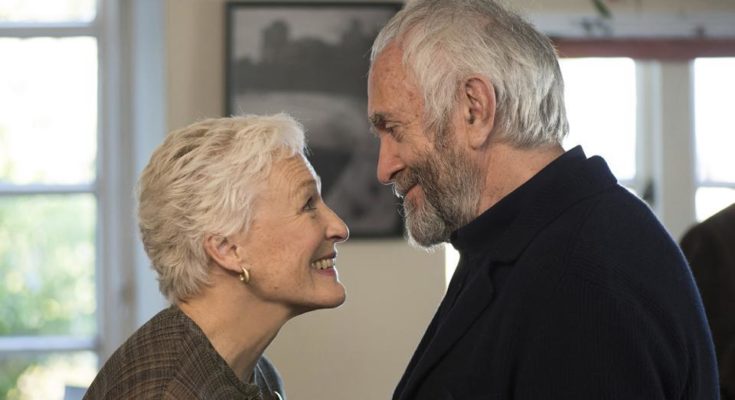It’s 1992, Connecticut. Joan and Joe Castleman (Glenn Close and Jonathan Pryce) lie in bed failing to fall asleep, anxiously anticipating a phone call. Later Joe gets up and downs some sweets to calm his nerves for tomorrow the Nobel Prize Honorees will be announced. Awoken at dawn they hear the news exactly as they dreamed. In the following days there are celebrations, dinners and plans for the upcoming trip to Sweden. We recognize how they complement each other, Joe being casual, vain and absent-minded while Joan is composed, elegant and self-effacing.
After learning he won the Nobel, Joe tells admirers, “My wife’s not a writer.” The comment irks Joan, yet she lets it pass. It’s the window into their fraudulent partnership.
On the Concorde flight to Stockholm, the family is approached by a relentless Nathaniel Bone (Christian Slater) who is set on writing Joe’s biography, with or without his participation. Joe rejects his pleas, uncomfortable with his intrusion. However, Joan advises a more diplomatic approach, a foreshadow of what’s to come, when things began to fall apart.
In Stockholm, we see why the Castlemans dislike such a journalist poking into their lives when Joe takes a shine to the pretty young photographer (Karin Franz Korlof) assigned to document his stay. Joan takes notice of this budding dalliance but lets it slide. It’s happened before. Interspersed flashbacks fill in the gaps, back to the 1960s when young Joe (Harry Lloyd) was a struggling married writer teaching creative writing at Smith College and Joan (Annie Starke) was his eager student showing considerable talent. They have an affair, he leaves his wife to marry her. Soon Joan abandons her ambitions realizing writing is male dominated game and that her talents are a threat to the self-esteem of the man she loves.
In preparation for the award acceptance, the attendees practice the ritual ceremony bowing to the King, then other prize winners and finally the audience. As Joe does his, he feels faint and has to be helped from the stage. Was it nerves, guilt, or maybe a health issue?
You might think that the Nathaniel Bone character is the antagonist in this story. However, as the story unfolds, he becomes the catalyst opening the scars of a fraudulent life. In the revealing scene at the pub between Joan and Nathaniel, we feel how her recognition in Joe’s success has been overlooked. Joan bobs and weaves, side-stepping Bone’s accusations, remaining the selfless loyal wife, but underneath is the pent-up frustration of always giving, never getting back. A superbly played scene that has so many levels. It’s a scene of escaping, as she drinks too much, smokes, something she’s avoided for years, and almost spills the beans about the marriage.
Within this pub scene, there’s a telling flashback that does spill the beans and reveals the crux of their relationship. It’s the open wound that festers in the climactic scene of the movie. After Joan walks out at the award’s dinner, Joe follows her back to the hotel. Thirty years of marriage unravel as they unleash their pent-up resentments and frustrations. As the truth comes out, it becomes a catastrophic ending to what first appeared to be a happy, loving relationship.
The standout performance by Glenn Close is one of restraint, concealing while at the same time revealing the turmoil underneath. It’s an onion-like layer presentation where we only see bits and pieces, yet as they accumulate we slowly get the full picture. Playing the devoted wife, she must keep his secrets, and in this extraordinary, riveting, complicated role, Glenn Close gives the best performance of her career.
As the cantankerous, conceited old writer, Jonathan Pryce vividly portrays the needy, narcissistic husband with suspect writing skills. This is demonstrated when his son David (Max Irons) repeatedly asks for an appraisal of his short story and again when Joe can’t remember the name of the lead character in his most popular book. Yet he has those moments when he is appreciative and loving; where all must be forgiven.
Christian Slater plays the smooth-talking journalist Nathaniel Bone, who seeks fame in doing a biography on Joe Castleman, especially now that he’s won the Nobel Prize. This is a difficult role as he skillfully turns a casual conversation into an impromptu interview gaining material for his book. His scene with Close is the centerpiece of the story as it reveals the depth of Joan’s resentment.
Jane Anderson’s script aptly applies screenwriting instruments, namely foreshadowing, flashbacks, and well-placed plot points. The dialogue is crisp yet filled with enough context to pull us deeper into the characters. In this #MeToo era, the premise, that of neglected respect is most relevant.
Direction by Bjorn Runge is straight forward allowing the highly capable cast to do their thing. With most of the story taking place within the minds of the characters he focuses on their emotional content rather than the informational. For this he uses a delicate balance of action and re-action shots.
Production values are top-notch and nicely display the pageantry of Stockholm and its Nobel Prize Ceremony. Jocelyn Pook”s musical score keeps us emotionally involved, yet making the outcome ambiguous. Editing and sound effects give us that, “We are there,” feeling.
The Wife is a revealing emotional journey, celebrating feminism and self-discovery.
While screened at film festivals in 2017 (and subsequently acquired for distribution), it was rumored to have been held for release until 2018 in order to give Glenn Close a better shot at an Oscar nomination. Young Joan is played by the daughter of Glenn Close, Annie Starke. Though set in Connecticut and Stockholm, the majority of the film was shot in Glasgow, Scotland.
CREDITS: “The Wife” stars Glenn Close, Jonathan Pryce, Christian Slater, Max Irons, Harry Lloyd, Annie Starke, and Alix Wilton Regan. Director: Bjorne Runge, Writer: Jane Anderson (adapted from Meg Wolitzer’s novel), Producers: Claudia Bluemhuber, Meta Louise Foldager Sorensen, Rosalie Swedlin, Piers Tempest, Jo Bamford, and Piodor Gustafsson, Editor: Lena Runge, Production designer: Mark Leese, Director of photography: Ulf Brantas, Costume designer: Trisha Biggar, Music: Jocelyn Pook, Song: “Let’s Fly Away” Written by Joe Lervold & Julius Robinson, Performed by Joel Evans Big Band featuring Patrick Tuzzolino. Production Companies: Tempo Productions Limited, Anonymous Content, Meta Film, Silver Reel, Spark Film & TV. Distributor: Sony Picture Classics. Running Time: 100 minutes.



